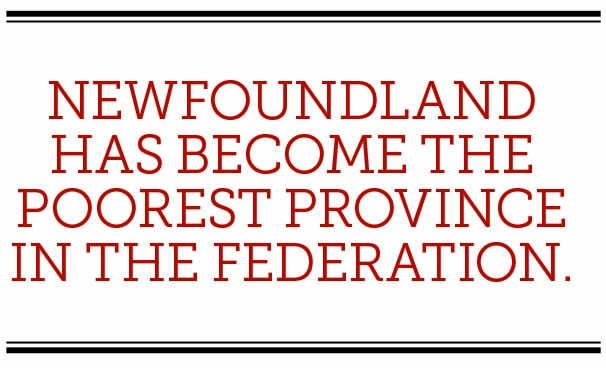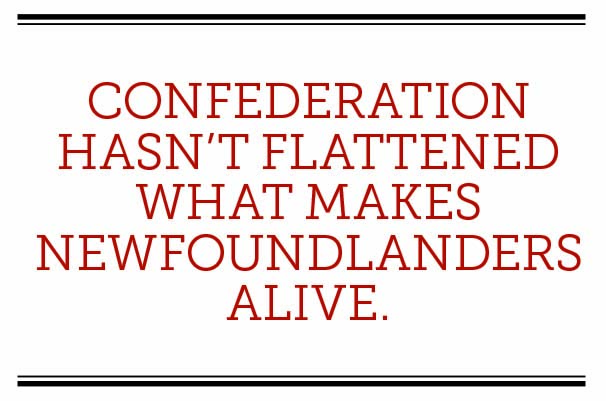
Those Newfoundlanders who voted for Confederation in the 1948 referendums did so for pragmatic, unsentimental reasons. The country, especially that part of it beyond the Avalon Peninsula, was indigent, isolated, poverty-stricken, dependent on the whims of a fickle fishing industry. Most of these people had never been to Canada, had never met anyone who had been there and did not know anything about it. They could not feel patriotism for a country of which they knew nothing. They voted, understandably, for Canada because to do so, as Joey Smallwood explained to them, might mean some extra money in their pockets from Canada’s social “welfare” programs, including the baby bonus, a stipend from the country awarded on a per-child basis.

Most of those who, in the same referendums, voted for a return to independence, did so for patriotic reasons. You can feel patriotic about a country that you know from having lived in it all your life. You can love such a country without glossing over its geographically determined shortcomings. You can be justified in thinking of it as your country. If you happened to live in the most prosperous part of that country, as was the case with most of those who voted for independence, your material sacrifice was far less than your isolated countrymen. Small wonder, then, that the vast majority of people from St. John’s voted for a return to independence.
Many other factors were involved in the referendums, far too many to enumerate here. But I’ll say that the question boiled down to patriotism versus pragmatism—and pragmatism won, if just barely.
However, the question “Would Newfoundland be better off if it had never joined Canada?” can only be answered “Yes.”
Since joining Canada, Newfoundland has become the poorest province in the federation, chronically so except for a brief boom when oil was selling at more than $100 a barrel. Combining the unemployed, those who no longer look for work, and those on welfare, Newfoundland’s true unemployment rate approaches near-Third World levels. Its hydroelectricity, most of it from Labrador, enriches the province of Quebec and fills the federal coffers while Newfoundland gets next to nothing—in the case of the Churchill Falls and Muskrat Falls hydroelectric projects, and even in that of oil, Newfoundland has had to negotiate with its hands tied by dint of it being part of Canada. In a place as traditionally poor as Newfoundland, there is, or so it seems, only one way to develop a megaproject: give the natural resource (hydro, oil) away to some foreign country or corporation that can afford to exploit the resource in exchange for short-term jobs building infrastructure.
How has this worked out for Newfoundland? The province has a debt of more than $12 billion, an annual deficit of nearly $2 billion and a crippling annual interest payment that will balloon the debt to more than $20 billion within five years—an unsustainable number. Without a resurgence in oil prices, yet another bankruptcy is a near certainty.
In an independent Newfoundland, the cod fishery, a sustainable, non-polluting resource, would have been managed by Newfoundlanders, not by federal politicians, scientists and civil servants who allowed foreign freezer trawlers to vacuum our ocean floor for years at a time, destroying the northern cod stocks. An independent Newfoundland would have a fishery that was viable on every coast of the island and Labrador. It would not be rich, perhaps not as well off as mainland provinces are now—but then, much worse is true of the confederate Newfoundland of today.
An independent Newfoundland would not be a dependent Newfoundland, forever going cap in hand for handouts from the feds and foreign corporations. And independent Newfoundlanders would not have to put up with the mockery, scorn, condescension and bigotry that is inherent in the term Newfie.

Confederation. I too dislike it. Although it has its advantages.
I live in Toronto now, but I grew up in Newfoundland. When I was a kid, the neighbours were an old couple named Shears. Mr. Shears, born in 1909, had come to work in the paper mill. He chose the pensioned life of a millworker over the perils of the fishery. He began work as a Newfoundlander and retired as a Canadian. And on the wall in his basement, where he showed me how to fill snowshoes, was a Canadian flag and a Union Jack pinned side by side.
Here in Toronto, there is a house I pass while I walk the dog. On the veranda is draped a pink, white and green Newfoundland flag. The province’s official flag has a yellow arrow that brims with the precise volume of a diminished status. But this unofficial tricolour possesses the simple confidence of a nation.
I won’t talk of social insurance or pensions or job prospects or education or transfer payments, the introduction of soda pop, the repercussions of religion or the toil and trade that sears the shore. Set aside how we cry over the plight of our Beothuk and yet are frustrated at the predicament of the Innu in Labrador. Let’s not examine powers and obligations written into the terms of union which Ches Crosbie refused to sign, or the effects of a cod fishery which his son John closed down. I will forego any comparison to Iceland or Cuba. I am for confederation because nation-building is an overstressed notion. The only reason to have Canada—the least nationalistic country on Earth—is to share the risk of a capitalist economy on the edge of a continent. If we were independent, our politicians would have sold Labrador to the highest bidder, guaranteed.
I am a regionalist. I believe a person loves a mountain or a lake or a river. They love an island. It is hard for an individual to fall in love with a continent. A continent will never be loved the way a hill is, or a migration of birds. Confederation does not dilute the love one has for a valley. Confederation prevents, through shame, a small government from depriving a dead soldier’s widow a pension. It halts a multinational firm from dumping toxic tailings into a river system. It prevents a return to a culture with fixed values. Or at least, it should.
I’m for romance, and land doesn’t change nor do the people because of a contract. Confederation hasn’t flattened what makes Newfoundlanders alive. Percy Janes’ novel House of Hate starts, “Hate is the child of fear, and Saul Stone had been afraid of one thing or another all his life.” The pressures of hunger, despair and religion: that’s what confederation has lessened.
I will accept, as my neighbour Mr. Shears did, the safety net that Canada provides and the buffer a federal government offers over the risk of the mercantile, political and religious classes that put people in the predicament of Saul Stone.
There is an acre of land in the mind of the every Newfoundlander. That imagined acre is Newfoundland. And I support the independent nation of the mind—there is truth in a pastoral work of fancy. Let us cultivate our dreamt-up gardens, offer a reproach to the political thinkers who confuse dreams with reality, accept how lucky we are to keep our borders and yet be generous enough to offer Canada and the world any surplus when we generate a living.

Let us please our souls with the joy of the life of the mind enacted in a physical space, celebrate a shared connection, either through language or love or the ages, on the east coast of this smiling, frozen, windswept land.
Advertisement





















